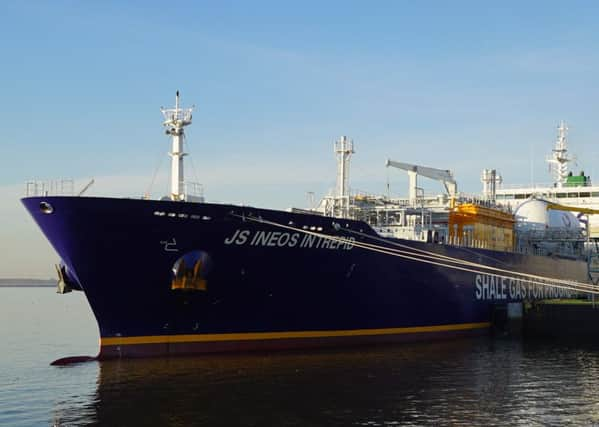Billion pound investment will secure future of Grangemouth site says boss


It will be the first of many shipments from the United States carrying ethane sourced from wells thousands of miles away in the Marcellus basin, a shale rock formation covering 104,000 square miles which includes large parts of Pennsylvania, West Virginia, Ohio and upstate New York.
Jim Ratcliffe, the billionaire owner of Ineos, has signed contracts to ensure he receives a similar delivery every three weeks - for the next 15 years - to feed his refinery.
Advertisement
Hide AdAdvertisement
Hide AdThe irony is of course that Ineos has been forced to use a terminal at Marcus Hook on the Delaware River in Pennsylvania to load its shale gas needs - a natural resource Ineos and the rest of Falkirk district is sitting right on top of.
There is apparently simply no shortage of the stuff - latest estimates say there is 80 trillion cubic feet of shale gas under the Central Belt alone.
The stumbling block to reaching it is the Scottish Government’s moratorium into the controversial hydraulic fracturing or ‘fracking’ process required to get the gas out of the ground.
Drilling vertically and horizontally into shale rock thousands of feet below and then injecting a high pressure mix of water, sand and chemicals into the cracks to allow the gas to flow up to the well head is the way it is done.
Advertisement
Hide AdAdvertisement
Hide AdAs a result the city of Pittsburgh, Pennsylvania, is benefitting from a boom predicted to generate £230 billion in economic output and £17 billion in tax revenue by 2023.
On this side of the ‘pond’ campaigners against fracking argue the process releases potentially carcinogenic chemicals, threatens to pollute the environment and has even caused earthquakes.
While the moratorium is in place, and a final report is not expected until the end of the year, Ratcliffe has been prevented from drilling for the known shale gas reserves below his own refinery.
But that has not stopped Ineos investing £1.5 billion to get its hands on the equivalent of over 40,000 barrels of gas every day right now to protect its future and the livelihoods of 10,000 people dependent on Grangemouth.
Advertisement
Hide AdAdvertisement
Hide AdThe shale gas being transported in a fleet of ships specially built to carry it across the Atlantic will be pumped into the largest ethane storage tank in Europe before being used to manufacture the raw materials that go into making products from packaging to car parts, to medical applications and construction and some renewable technologies.
An Ineos spokesman said: “If we don’t provide the products, UK manufacturing has to get it from somewhere else. The ethane is not used for power, but as the basic building block chemical we use to make plastics.”
Ratcliffe has long maintained Scotland’s economy can only benefit from a strong energy industry with shale the key.
Speaking in New York this week at a ceremony to reward his contribution to American industry, he said: “Grangemouth would have closed had it not been for our decision to invest. There just isn’t enough gas in the North Sea to operate the site, so whether the Scottish politicians like it or not, the shale gas which has come from the US rather than the UK has saved 10,000 jobs in the Falkirk area.”
Fracking boom
Advertisement
Hide AdAdvertisement
Hide AdIn 2001, Pittsburgh in Western Pennsylvania, appeared to be a city with no future.
The steel industry that had supported the area for more than a century had gone, hundreds of thousands of mill workers were losing their jobs and unemployment and crime was rife.
Today the city of 2.4 million is booming. Hotels, restaurants, colleges and offices are springing up, work is plentiful and wages are high.
The reason for such a dramatic transformation in Pittsburgh’s fortunes – now the home to millionaires – is fracked shale gas.
Advertisement
Hide AdAdvertisement
Hide AdWhile the Scottish Government continues to seek expert advice on the potential impact of the process and concerned campaigners continue to campaign against it, Pittsburgh has been transformed and its people continue to benefit from having this spectacular money-maker under their feet.
From wells in the Marcellus basin, fracked gas is piped to a terminal at Marcus Hook on the Delaware River and loaded onto ships - including last week a 600 foot long brand new tanker owned by Ineos which is due to arrive in Grangemouth on Tuesday.
Pittsburgh has risen from the ashes on the back of shale gas and the chief operator of the company Ineos boss Jim Ratcliffe has hired to keep his refinery running is wondering why Scotland has not followed its lead.
Tim Dugan of Consul Energy suggests Scotland could be the next Pittsburgh – if Scottish politicians educate themselves fully on how fracking works.
Advertisement
Hide AdAdvertisement
Hide AdHe said: “Pittsburgh is a great example of what the energy industry can do for the economy. The impact of shale here has been absolutely phenomenal. Most of what people know about shale is the snippets they read on the internet or newspapers. They don’t truly understand what we do or how much they rely on our industry because there is almost nothing we do or touch that doesn’t rely on the energy we produce.”